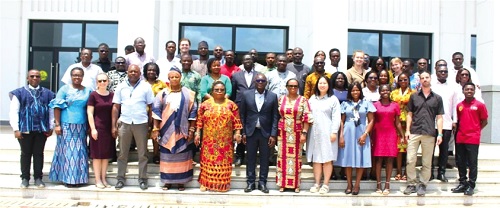Integrating Mental Health and Neglected Tropical Disease Intervention to Support Equitable People Centred Care in Ghana (IMAGINE Ghana Project) has kicked off with a meeting hosted by the Centre for Neglected Tropical Disease Research (CNTDR) at the University of Health and Allied Sciences (UHAS) at Sokode Lokoe, in the Volta Region.
IMAGINE Ghana Project is an adaptation of the World Health Organisation’s (WHO) Essential Care Package (ECP) for Neglected Tropical Diseases (NTDs), Stigma and Mental Health Conditions.
This initiative brings together researchers, policymakers, health workers and individuals affected by NTDs to develop and implement context-specific solutions.
The project seeks to improve early detection and treatment of skin NTDs and enhance mental health and NTD care in Ghana. It also strengthens person-centred care and the integrated mental health care management in Ghana.
Partner organisations
Partner organisations include Liverpool School of Tropical Medicine, ANESVAD Foundation, Effect Hope, National NTD Programmes, Mental Health Authority and Ministry of Environment and Science and Technology.
Expected outcomes
The study of IMAGINE Ghana Project is expected to provide practical, scalable and evidence-based solutions to improve the early detection, treatment and mental well-being of people affected by skin NTDs in Ghana and beyond.
In all, 35 participants were drawn from the National NTDs Control Programme of the Ghana Health Service (GHS), Yaws and Buruli Ulcer Elimination Programme, Leprosy Control Programme, Mental Health Department of the GHS, the Mental Health Authority, the Ministry of Environment Science and Technology, the Ellembelle District Health Directorate of the GHS, the Bole District Health Directorate of the GHS, among others.
The Vice - Chancellor of UHAS, Prof. Lydia Aziato, who welcomed the participants, stressed the importance of ensuring sustainable interventions at the end of the IMAGINE Project and the need for the project outcomes to enhance education, ensuring that findings inform communities and policy.
She emphasised the achievements of UHAS, noting that they resulted from strong collaboration, commitment to a participatory approach, inclusivity, and support from all relevant stakeholders.
The participants were taken through overview of IMAGINE Ghana Project, lessons learnt from REDRESS, situational analysis and priority setting, evidence translation and implementation, applied health systems research, quantitative evaluation and costing analysis, training and capacity strengthening, community engagement, scale of intervention and potential for embedding in routine the GHS activities for efficient resource utilisation and sustainability and partnership values and equitable working among others.
The Principal Investigator and Director, Centre for Neglected Tropical Diseases Research, University of Health and Allied Sciences, Dr Alfred Kwesi Manyeh, in his presentation, said, NTDs disproportionately affected the poorest people in the poorest countries and caused physical pains, disfigurement, stigma and discrimination.
As a result, it affected persons' experience, mental distress, including depression and anxiety.
He said WHO recently developed guidelines for mental health awareness and care as part of the management of persons affected by NTDs.

